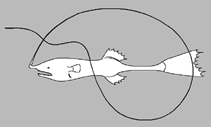| Family Gigantactinidae - Whipnose anglers | ||||
| Order | : | Lophiiformes |


|
|
| Class | : | Teleostei | ||
| No. in FishBase | : | Genera : 2 | Species : 25 Eschmeyer's Catalog of Fishes | ||
| Environment | : | Fresh : No | Brackish : No | Marine : Yes | ||
| Division | : | Marine | ||
| Aquarium | : | none | ||
| First Fossil Record | : | |||
| Remark | : | From Nelson (1994). Distribution: Atlantic, Indian, and Pacific. Females with elongate body. Length of illicium almost that of body or longer. Upper jaw jutting slightly past the lower jaw. Pectoral radials 5. Dorsal fin rays 3-10. Anal fin rays 3-8. Caudal fin rays 9. (Ref. 7463) Other distinguishing characters: Indicating a comparatively higher level of locomotion, the female body is slender, laterally compressed, streamlined, with a relatively short head, and long, narrow caudal peduncle; large horizontal mouth, the cleft terminating past the eye; small pectoral fins; the caudal fin usually deeply cleft at its posterior margin, almost always with 1 or 2 greatly extended dorsal- and ventral-most rays; unusually large and laterally compressed illicial pterygiophore; illicium very extended (highly variable lengths from 40 - 490% SL; full relative length at 3 cm SL); dentition highly variable; very large, well ossified, and heavily toothed second and third pharyngobranchials set in a forward position in the roof of the mouth; acoustico-lateralis system set on serially connected short stalks of pigmented skin along narrow unpigmented grooves; hypertrophied illicial pterygiophore, illicium and upper pharyngeals; vomer, pterosphenoids, mesopterygoids, and ossified scapulae all absent; supraethmoid and parietals much reduced or absent; sphenotic, quadrate, articular, angular, and preopercular spines all absent; the preopercle, interopercle, opercle, and subopercle all shrunken into small, thin bony struts; ligament connecting the interopercle and the angular is also absent; simple dentaries attached at the symphysis by thick elastic connective tissue, with no posterior bifurcation and lacking a symphysial spine; long and narrow premaxillae (well ossified in Gigantactis and much reduced in Rhynchactis) and lacking ascending or postmaxillary processes; maxillae may be absent or reduced to threadlike ossifications. Metamorphosed males with uniquely small eyes (3 to 5% SL diameter), large olfactory organs (8 to 10% SL depth); anteriorly directed and closely set anterior nostrils; well developed maxillae but degenerate premaxillae; almost all, if not all, denticular teeth mutually free; the upper denticular bone with no connection to the illicial pterygiophore, teeth count: 3 - 6 (rarely 2); lower denticular with 4 - 7 teeth (rarely 3); skin may be naked or densely covered with dermal spinules; males free-living, evidently nonparasitic. Larvae distinguished by extraordinarily large pectoral fins (45 to 55% SL); somewhat short, spherical body; highly inflated skin; sexual dimorphism occurring even in youngest larvae (females with a small, club-shaped illicial rudiment on the head; metamorphosis commences at 0.8 to 1.0 cm; subsequent developmental stages at 0.9 to 2.0 cm size range. Dorsal-fin rays: 3 to 9, anal-fin rays: 3 to 7, pectoral-fin rays: 14 to 22, and caudal-fin rays: 9 (extremely short ventral-most ray under the skin of the adjacent ray). Largest known female measures 43.5 cm (not yet sexually mature). Largest known male 2.2 cm. (Ref. 86949) | ||
| Etymology | : | Greek, 'gigas' or 'gigantos' = gigantic + Greek, 'aktis' = ray (referring to the unusually long first dorsal-fin spine that functions as a lure in this genus) (Ref. 86949) | ||
| Reproductive guild | : | nonguarders | ||
| Typical activity level | : | |||
Main Ref. |
: | Nelson, J.S. 1994 | ||
| Coordinator | : | |||
Deep Fin Classification

|
: | Osteichthyes | Actinopterygii | Actinopteri | Neopterygii | Teleostei | Osteoglossocephalai | Clupeocephala | Euteleosteomorpha | Neoteleostei | Eurypterygia | Ctenosquamata | Acanthomorphata | Acanthopterygii | Percomorphaceae | Eupercaria | | | Lophiiformes | Ceratioidei | | Gigantactinidae | ||
Important recommendation:
The list below must not be used as an authority reference synonymy list like those found in scientific published revisions, which must be the source to be used and cited eventually when they exist.
Rather, it reflects the current content of FishBase, and the progress with respect to synchronization with the Catalog of Fishes. However, we think it can be useful for users to assess the quality of information in FishBase, to start new work on the family, or to cross-check with other lists.
But we appreciate to be cited in publications when this list has been of any working value. In particular, for published scientific, we suggest then to cite it in the Material and Method section as a useful tool to conduct the research, but again, not as a taxonomic or nomenclatural authority reference.
Unless it is explicitly precised, the list is not complete, please search all original names published for the family in the Catalog of Fishes (genera, species), including those with uncertain or unknown status, that are not included in FishBase when they are not attached to a valid species.
This list uses some data from Catalog of Fishes (not shown but used to sort names).
The list ordered as follows:
Please send comments and corrections if you detect errors or missing names.
| Scientifc name | Status | Senior/Junior synonym | Combination |
|---|---|---|---|
Gigantactis vanhoeffeni Brauer, 1902 | accepted | senior | original |
Gigantactis exodon Regan & Trewavas, 1932 | synonym | junior | original |
Gigantactis perlatus (non Beebe & Crane, 1947) | misapplied | misapplied | original |
Gigantactis gracilicauda Regan, 1925 | accepted | senior | original |
Gigantactis sexfilis Regan & Trewavas, 1932 | synonym | junior | original |
Gigantactis macronema Regan, 1925 | accepted | senior | original |
Gigantactis microphthalmus (Regan & Trewavas, 1932) | accepted | senior | new |
Teleotrema microphthalmus Regan & Trewavas, 1932 | synonym | senior | original |
Gigantactis longicirra Waterman, 1939 | accepted | senior | original |
Gigantactis perlatus Beebe & Crane, 1947 | accepted | senior | original |
Gigantactis elsmani Bertelsen, Pietsch & Lavenberg, 1981 | accepted | senior | original |
Gigantactis gargantua Bertelsen, Pietsch & Lavenberg, 1981 | accepted | senior | original |
Gigantactis gibbsi Bertelsen, Pietsch & Lavenberg, 1981 | accepted | senior | original |
Gigantactis golovani Bertelsen, Pietsch & Lavenberg, 1981 | accepted | senior | original |
Gigantactis herwigi Bertelsen, Pietsch & Lavenberg, 1981 | accepted | senior | original |
Gigantactis ios Bertelsen, Pietsch & Lavenberg, 1981 | accepted | senior | original |
Gigantactis kreffti Bertelsen, Pietsch & Lavenberg, 1981 | accepted | senior | original |
Gigantactis meadi Bertelsen, Pietsch & Lavenberg, 1981 | accepted | senior | original |
Gigantactis microdontis Bertelsen, Pietsch & Lavenberg, 1981 | accepted | senior | original |
Gigantactis paxtoni Bertelsen, Pietsch & Lavenberg, 1981 | accepted | senior | original |
Gigantactis savagei Bertelsen, Pietsch & Lavenberg, 1981 | accepted | senior | original |
Gigantactis watermani Bertelsen, Pietsch & Lavenberg, 1981 | accepted | senior | original |
Gigantactis balushkini Kharin, 1984 | accepted | senior | original |
Gigantactis longicauda Bertelsen & Pietsch, 2002 | accepted | senior | original |
Gigantactis cheni Ho & Shao, 2019 | accepted | senior | original |
Gigantactis paresca Rickle, 2024 | accepted | senior | original |
Rhynchactis leptonema Regan, 1925 | accepted | senior | original |
Rhynchactis macrothrix Bertelsen & Pietsch, 1998 | accepted | senior | original |
Rhynchactis microthrix Bertelsen & Pietsch, 1998 | accepted | senior | original |